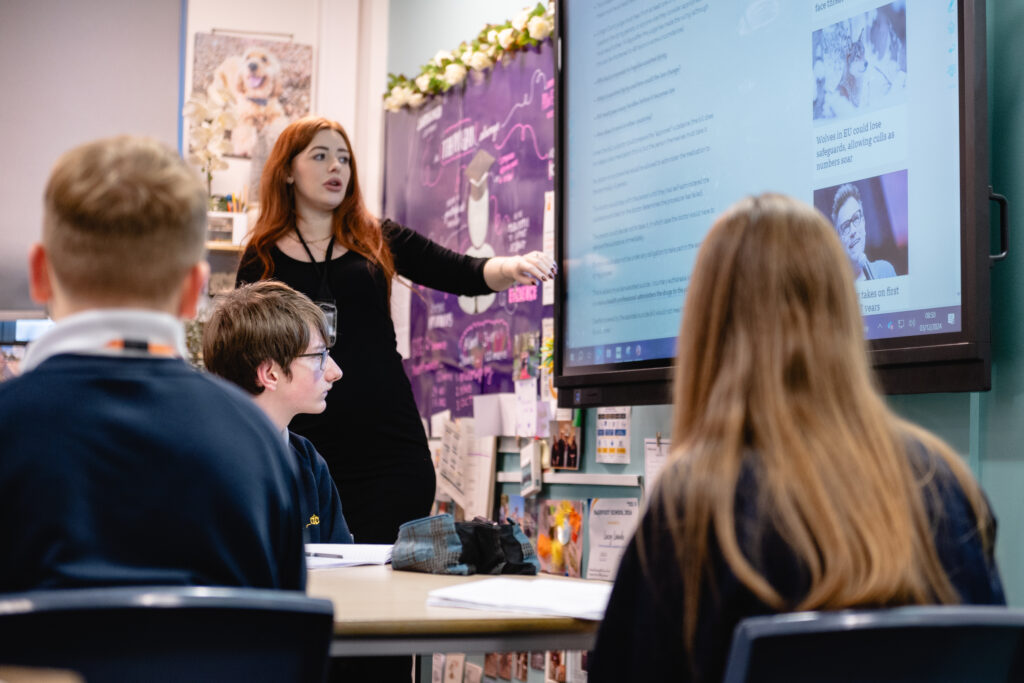Students will develop an appreciation for the influence and impact that religion has had on the world and its people.

While studying RE at Beckfoot, students will learn from and about religions and world views in their local, national and global communities. The purpose of RE is to develop the spiritual and moral identity of a child through talk, debate and study of religious belief and practices. Students will be equipped with systematic knowledge of a range of religions, worldviews, ethical dilemmas and philosophies, and they will be encouraged to reflect, critique and compare this knowledge to their own values and identities.
Pupils will gain in-depth knowledge of sources of wisdom and develop critical skills in analysis, evaluation, explanation and comparison through this.
Enrichment
Religious Education champions all British Values such as tolerance, by facilitating the chance to engage with different worldviews and attitudes.
Religious Education celebrates the positive contributions that religion and its people make in the school and wider communities and can promote community cohesion in the face of diversity.
Assessment
In years 7, 8 and 9, internal assessments will take place throughout each year to monitor student progress and further inform teaching and learning.
KS4 Specification
Careers
Religious education prepares our students for the myriad of active and influential faiths around the world. Students will develop essential skill such as argumentation, evaluation and analysis to equip them for future careers and ventures.
Curriculum Overview
| Year | Cycle 1 | Cycle 2 | Cycle 3 |
|---|---|---|---|
| Year 7 | Sacred Six: Students will encounter the big six religions to develop religious literacy and learn about these religions in chronological order | Judaism: Students will understand Jewish beliefs and practices and know that the covenant influences all parts of life, such as Jewish identity, clothing and festivals Christianity: Students will know that the Trinity is the core Christian belief and the characteristics of each person in the Trinity and apply this knowledge to parables | Islam: Students will know key Muslim beliefs and practices and learn about the Sunni/Shia split, how Muslims are portrayed in the media and the difference between personal faith and institutional What is wisdom? Students will learn about Ancient Greek Philosophy from Plato on wisdom |
| Year 8 | Evil and suffering: Students will explore the question if whether evil means God cannot exist Atheism and Humanism: Students will explore atheist arguments and humanist values to learn how people can place meaning without religion | Science and religion: Students will learn that science and religious beliefs about truth, creation and evolution can be conflicting Hinduism: Students will know key Hindu beliefs about the nature of God and how this is manifested in the form of different Gods and Goddesses | Sikhism: Students will know key Sikh beliefs about the nature of God, pilgrimage and equality, students will know about the lives of two gurus and how they influence Sikhs today Rights and religion: Students will know that humans and animals have rights and what the main six religions trach about this |
| Year 9 | Ethical enquiry: Students will explore ethical debates and the different religious responses to them The extreme world: Students will know the difference between extremism and terrorism and the factors that can lead to radicalisation | The Abrahamics: Students will explore religious concepts that are important in monotheism, they will know the role of prophecy, angels, life after death and miracles for these faiths | Buddhism: Students will learn about the core beliefs of Buddhism such as the four noble truths, the four sights and the concept of attachment Famous Philosophers |
| Year 10 | Crime and Punishment: Students should study religious teachings and religious teachings and religious, philosophical and ethical arguments, relating to the death penalty, corporal punishment and forgiveness Christian beliefs: Students should study the beliefs, teachings and practices of Christianity specified below and their basis in Christian sources of wisdom and authority | Relationships: Students should study religious teachings and religious, philosophical and ethical arguments relating to homosexuality, sex outside of marriage and contraception Muslim beliefs: Students should study the beliefs, teachings and practices of Islam and their basis in Islamic sources of wisdom and authority | Peace and conflict: Students should study religious teachings and religious, philosophical and ethical arguments relating to weapons of mass destruction, violence and pacifism |
| Year 11 | Christian practices: Students should study the beliefs, teachings and practices of Christianity specified below and their basis in Christian sources of wisdom and authority | Religion and life: Students should study religious teachings and religious teachings and religious, philosophical and ethical arguments, relating to abortion, euthanasia and animal experimentation | Muslim practices: Students should study the beliefs, teachings and practices of Islam and their basis in Islamic sources of wisdom and authority |